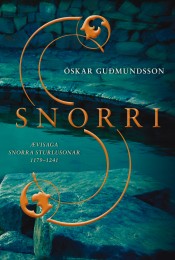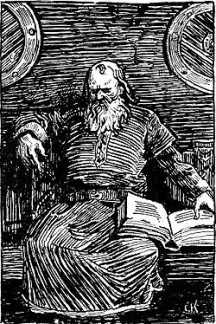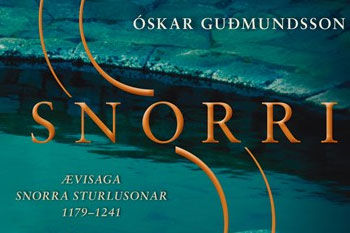Snorri Sturluson – A Biography
The story of the life of one of the most remarkable men in Icelandic history has been written for the first time as a comprehensive biographical work. Ævisaga Snorra Sturlusonar/The Biography of Snorri Sturluson by Óskar Guðmundsson is an important contribution to medieval scholarship.
The first comprehensive biography
 At the end of last year, Óskar Guðmundsson's book on the life of Snorri Sturluson was published. The first comprehensive biography of one of the most renowned and influential figures who has ever lived in Iceland, it was one of the best-selling titles in the run-up to Christmas. The book brings a uniquely important historical figure closer to the modern reader in an accessible yet scholarly biography, which is a landmark in the discourse on this fascinatingly complex character.
At the end of last year, Óskar Guðmundsson's book on the life of Snorri Sturluson was published. The first comprehensive biography of one of the most renowned and influential figures who has ever lived in Iceland, it was one of the best-selling titles in the run-up to Christmas. The book brings a uniquely important historical figure closer to the modern reader in an accessible yet scholarly biography, which is a landmark in the discourse on this fascinatingly complex character.
Snorri Sturluson (1178-1241) is the first Icelandic author identified by name. Probably no other Icelander has had as much impact as Snorri on the cultural history of the Nordic nations. His contribution to world literature has deeply influenced the Nordic identity, and the effects of his writing continue to echo down the ages to our own time. With his writings, Snorri preserved evidence of the ancient Germanic cultural heritage; without his contribution our understanding of medieval culture would be limited.
The best-known of his writings is undoubtedly the Prose Edda, in which he recorded legends and lore of Norse mythology. The Edda is the principal source for the nature of the pagan medieval world-view. In addition to being a poet and historian, Snorri was also one of Iceland's most powerful magnates of the 13th century. Politician, historian and poet, he belonged to a network of power that spanned Iceland, and even extended to continental Europe.
Óskar Guðmundsson was well qualified to undertake this huge task: to portray in coherent form the life of a man who lived nearly eight centuries ago. A journalist and editor for many years in various media, for about 15 years Óskar has been an independent scholar, and been involved as an editor and author in many publishing projects. In the 1970s he studied history, literature and social science at universities in Iceland, Germany and Denmark, and for some time he has been active in medieval research.
His work on the life of Snorri Sturluson began nearly a decade ago. During that time, in 2000-04 he also published seven volumes about the middle ages in Iceland in the Aldir/Centuries series, covering the period from the settlement of Iceland in the ninth century until the 15th. As he wrote the biography he was as close to his subject as a contemporary person can be: for the past six years he has been living in Reykholt in Borgarfjörður, Snorri's medieval manor, where a modern research centre, Snorrastofa, is named in his honour.
A cosmopolitan education
 Óskar traces Snorri's life story from his childhood, when he was sent in 1181 to be raised at Oddi, a leading centre of culture and learning, until his death by violence in 1241, at the height of the turbulent Sturlung Age. The book throws light on the cosmopolitan background to Snorri's education at Oddi, where he was educated in the international Christian culture of the middle ages. During his youth, Norwegian kings were extending their rule, while disputes between the church and secular authorities throughout Europe were also wide-reaching.
Óskar traces Snorri's life story from his childhood, when he was sent in 1181 to be raised at Oddi, a leading centre of culture and learning, until his death by violence in 1241, at the height of the turbulent Sturlung Age. The book throws light on the cosmopolitan background to Snorri's education at Oddi, where he was educated in the international Christian culture of the middle ages. During his youth, Norwegian kings were extending their rule, while disputes between the church and secular authorities throughout Europe were also wide-reaching.
Óskar points out that in Snorri's time the Icelanders still shared a language with the rest of the Norse world. Snorri's education, his background and his excellent poetic skills were a passport to intimacy with Norwegian royalty: he became a court poet, and in due course a liege man to the king. Like many Icelanders before him, Snorri rose to influence on foreign ground armed with his poetry.
The book gives a clearer and more personal portrayal of Snorri than has been the case before. For instance, the author explores the dramas of his personal life, and his relationships with his wives, his concubines and his children.
Iceland's most violent century
The book is not only the story of Snorri, but also of his time, and the mindset of medieval Iceland. At the time when Snorri rose to prominence as Iceland's wealthiest chieftain, the country was caught up in the Sturlung Age (named after Snorri's clan, the Sturlungs), which has been called Iceland's most violent century. The nation was convulsed by bloody civil war, in which kinsmen took up arms against each other. Óskar Guðmundsson gives a clear account of the conflict, which would ultimately lead to Iceland submitting to the rule of the King of Norway, and the part played by Snorri in those events.
Snorri was remarkably diplomatic for a man of that bellicose time, when bloodshed and vengeance were taken for granted. Some of his contemporaries even called him a coward for his unwillingness to fight. Surprisingly, he rose to a position of power, authority and wealth without ever wielding a weapon himself.
The main source on Snorri's life is Sturlunga saga, an account of the Sturlung Age written down as it happened by members of the Sturlung clan. The saga reflects conventional medieval views on powerful men, and generally ridicules Snorri for his alleged cowardice. In his book Óskar addresses this bias, and the perception of Snorri by his contemporaries, in order to draw up as accurate a picture of Snorri as is possible so many centuries later.
Contribution to medieval scholarship
The book gives a detailed account of the life of this extraordinary man, from cradle to grave, and the tumultuous times in which he lived, in a clear and accessible way. Much has been written about Snorri in scholarly papers and books, but now Snorri's life story is chronicled for the first time. Reviewers have described the book as a feat. Einar Falur Ingólfsson of daily Morgunblaðið awarded the book four-and-a-half stars of a possible five: “[Óskar has] set out to write an account which is readable, interesting and also exciting, and he has succeeded well. In fact one cannot help marvelling at the continuity of the narrative [...]. Óskar imbues the story with life and colour by staging scenes, and discussion of circumstances, individuals and issues.” And Páll Baldvin Baldvinsson, critic of daily Fréttablaðið, called the book an important contribution to the dissemination of medieval scholarship: “Óskar can be happy with this excellently-researched work, [...] he is clear in his own or others' interpretations of political and economic changes; he throws light on complicated relationships, and it is not unlikely that there may be some envy in the groves of academe, as Óskar stands with head high in the fortress he has constructed: This I have done well.”
